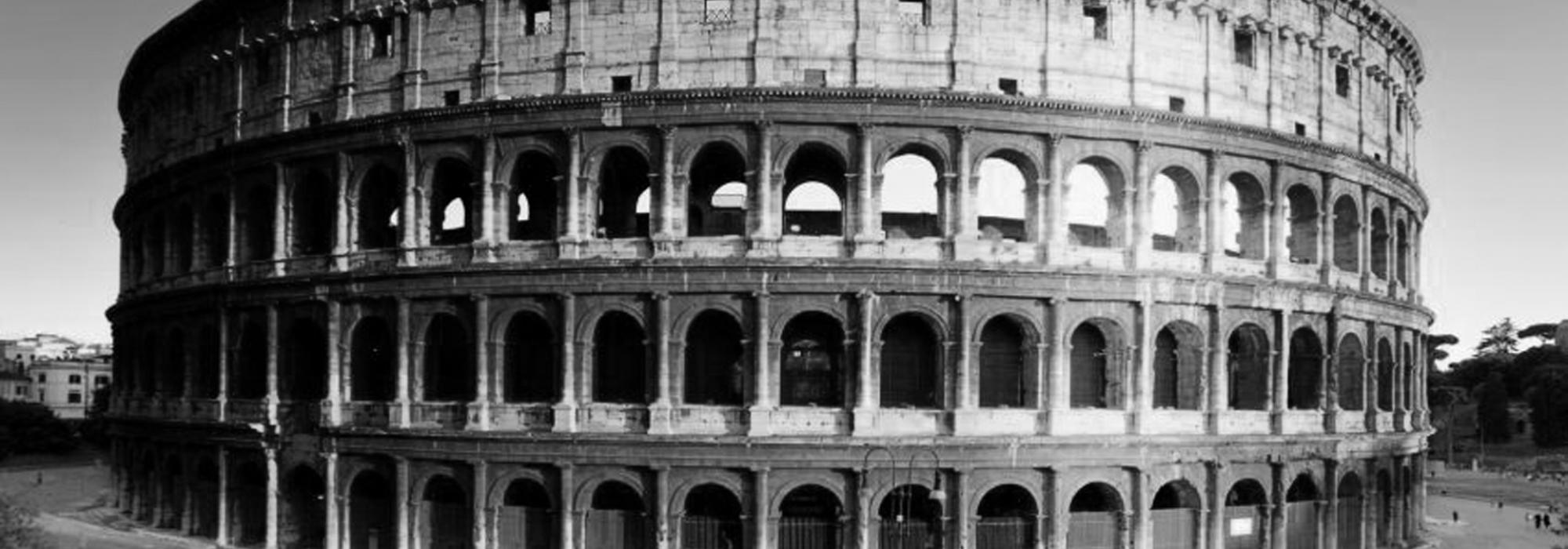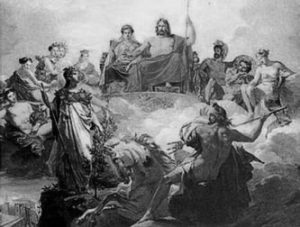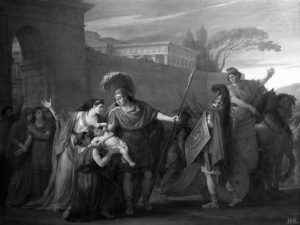Excessive greed and curiosity kill!
Patroclus, who is moved to pity by the words of Nestor and the sight of the causalities on the side of the Achaeans, makes up his mind to enter the battlefield. Although Achilles is hesitant at first, he allows Patroclus to lead the Myrmidons in his armor. He however warns him that he should only fight to defend the Achaean camp and retire as soon as the camp is cleared of the enemies. Patroclus agrees at first, but once he kills the Trojan hero Sarpedon, he gets carried away by the taste of victory. He marches up to the Scaean gates only to meet his death at the hands of Hector. There is also a hint that he was basking in glory, when the enemies and his own mates mistook him for Achilles, as he was wearing his armor. Thus, the poet subtly warns us that it is not just the desire for another’s spouse or kingdom that leads to one’s downfall, but greed for (other's) glory and fame can be a bane too!
In the Odyssey, Aeolous, the ruler of the winds gives Odysseus a leather bag containing all the winds expect the west wind. He does not tell Odysseus or his mates about the contents of the bag, but only warns them that it should never be opened. During their journey, however, the greedy and curious sailors open the bag while Odysseus is asleep. They suspect that the bag contained gold and that Odysseus wants to keep it all for himself. All the winds are let loose once the bag is opened and cause the death of many sailors and delays the return of Odysseus to his homeland. The sailors similarly disobey Odysseus regarding the sheep of Heliosa and invite death. In contrast with this, we see how Odysseus insists that he be tied to the mast of the ship, while they skirt by the land of the Sirens. He heeds the words of Circe, who advises him that he should not get enchanted by the melodious songs of the Sirens. He who listens to the advice of the experienced is thus safe and those who do not, end up dead.
Cultural aspects and attention to detail
Treatment of guests
The Odyssey provides examples for how guests were treated by the Greeks. While the Phaeacian royal couple and the shepherd Eumaeus of Ithaca serve as excellent examples for great hosts, the suitors who swarm Odysseus’s house, in contrast, are terrible examples both as guests and as hosts.
The Phaeacian King Alcinous says “…Zeus, who hurls the thunderbolt… walks in the footsteps of reverend suppliants” (O. B7, 165-167, 179-181) – A guest is to be treated as equal to the highest Olympian God. The king offers Odysseus a high seat on a bright chair and has his hands washed in a beautiful pitcher of gold. He then serves bread and delicacies in abundance to the guest and insists that the guest should rest before further conversation. So much of hospitality is offered to the guest by the king himself, even before he gets to know his identity. Listening to what the guest has to say comes only after his basic needs have been well met. The king arranges for various games to entertain the guest and listens to all his woes. He sees him off with lavish gifts that includes a fleet of ship to ensure his safe return home.
Eumaeus, looking at the beggar Odysseus, leads him to his hut, offers him the best seat he can – ‘the skin of a shaggy and hairy wild goat, spread over thick brush-wood’. (O. B14. 48-52). The seat was in fact the swineherd’s own bed. He offers the meat of young pigs as food and offers a drink out of his own bowl. He even lends Odysseus his own tunic to put on. The best which the swineherd had reserved for himself and was most dear to him, is offered readily by him to the guest. He listens to the ‘fake odyssey’ as reported by the beggar and feels intensely for him. He even addresses his guest, the stranger, as ‘father’, suggesting closeness in relationship.
The suitors in the first place have been living off the house of Odysseus for twenty years, and pestering his wife to marry one of them. They lack the humility of a guest and are rowdies with scant regard for cultural values. When Odysseus enters his own house in the guise of a beggar, he sees the suitors feasting. Upon noticing the beggar, one of the suitors, Antinous, says – “What god has brought this bane here, to trouble our feast? Stand off yonder in the midst, away from my table…you are a bold and shameless beggar” (O. B17, 445-450). The irony is that, firstly, the house where they happen to be feasting does not belong to them, but they speak with the tone of the lords of the house. Secondly, it is Odysseus himself who has been forced to come in the guise of a beggar to his own house and is being turned away without even a grain of food from his own granaries.
Extreme degradation of moral values and the degradation of respect for other living beings can be seen in the episode in which Odysseus and his mates happen to visit the cave of the Cyclops Polyphemus. He is aggressive in his approach from the beginning. Even when Odysseus seeks help and pity by saying “…and Zeus is the avenger of suppliants and strangers-Zeus, the strangers’ god-who walks in the footsteps of reverend strangers” (O. B9. 266-270). Polyphemus immediately answers with a pitiless heart “…You are a fool, stranger, or have come for afar, seeing that you bid me either to fear or to avoid the gods. For the Cyclopes pay no heed to Zeus, who bears the aegis, nor to the blessed gods, since truly we are far better than they. Nor would I, to shun the wrath of Zeus, spare either you or your comrades, unless my own heart should bid me….” (O. B.9 272-280). The barbaric person cares neither for the Gods nor for the humans and he even considers his own tribe greater than the Gods. He lays his hands on two comrades of Odysseus, smashes them on to the earth like puppies, making their brains gush out onto the earth. He cuts them limb from limb and eats them up without pity until the last bone.
The poet shows that a guest is treated in a similar manner by all hosts who feel for strangers, and this is in accordance with classical Greek culture too. This is evidenced in the similarity of treatment which Odysseus receives from the king Alcinous, who belongs to the highest strata of the society and from the swine-herd Eumaeus, who comes from the lowest strata. One is wealthy, the other is poor but both are rich at heart. In contrast, the suitors abide by no laws and seem to lack conscience. On the other extreme are the barbaric Cyclopes who even butcher their guests and eat them.
A toddler’s perspective – detailing
In the middle of a day during the war, the Trojan prince Hector returns to his city. He wishes to catch a glimpse of his wife Andromache and his baby, the little Astyanax. (IL. B6). He does not find them in the palace and heads back towards the Scaean gates, when Andromache comes running towards him, carrying the baby. The poet brings in a very touching scene when Hector stretches out his arms for the baby “…… Hector stretched out his arm to his boy, but back into the bosom of his fair-belted nurse shrank the child crying, frightened at the sight of his dear father, and seized with fear of the bronze and the crest of horse-hair, as he caught sight of it waving terribly from the top of the helmet…” (IL. B6, 466-480). The poet looks at Hector through the eyes of the baby. Under normal circumstances, the baby would have identified its father and would have happily gone to him with a smile. However, the poet does not forget that Hector is in the midst of battle, has his helmet on and he is drenched in blood, which naturally frightens the baby. This stands as proof that the poet is completely conscious of what he is saying and that he does not miss out on the details. When Hector removes his helmet, the baby comes smiling to him, as expected.
Furthermore, the poet even looks at Hector through the eyes of his wife, Andromache. When Hector bids farewell to his wife and son, “….and his dear wife went immediately to her house, often turning back, and shedding large tears” (IL. B6, 496). She keeps looking again and again in his direction, while her feet carry her towards her house. The poet makes even the body language evident and helps us imagine the expression of anxiety, distress and concern on Andromache’s face as she walks away. “….. Quickly she came to the well-built palace of man-slaying Hector and found there her many handmaids; and among them all she roused lamentation. So in his own house, they made lament for Hector while still he lived;…” The irony is that Hector indeed dies in the battle-field and never comes back to see his loved ones. As though Andromache had a premonition of this, she rouses lamentation in the palace.

















































